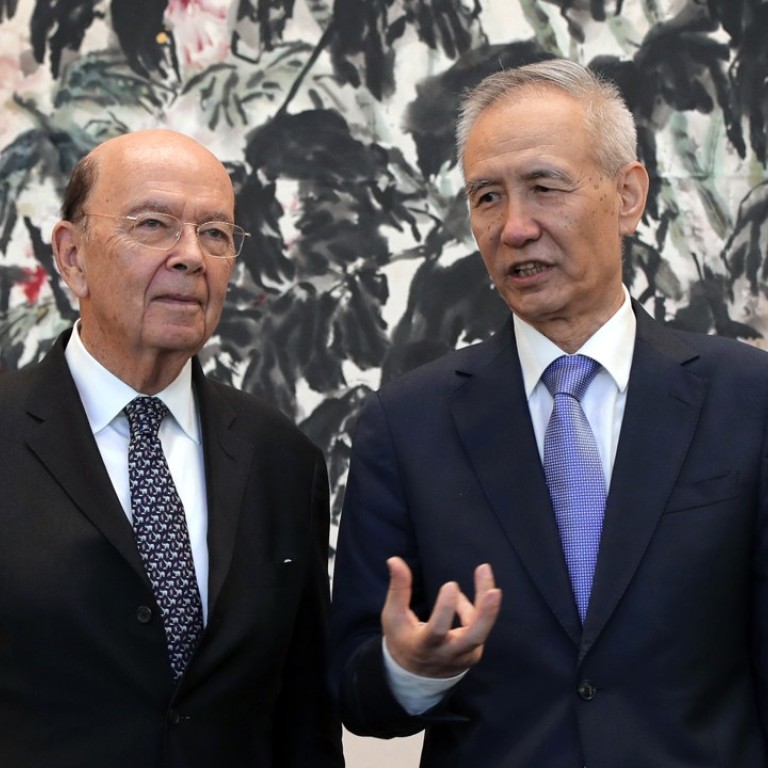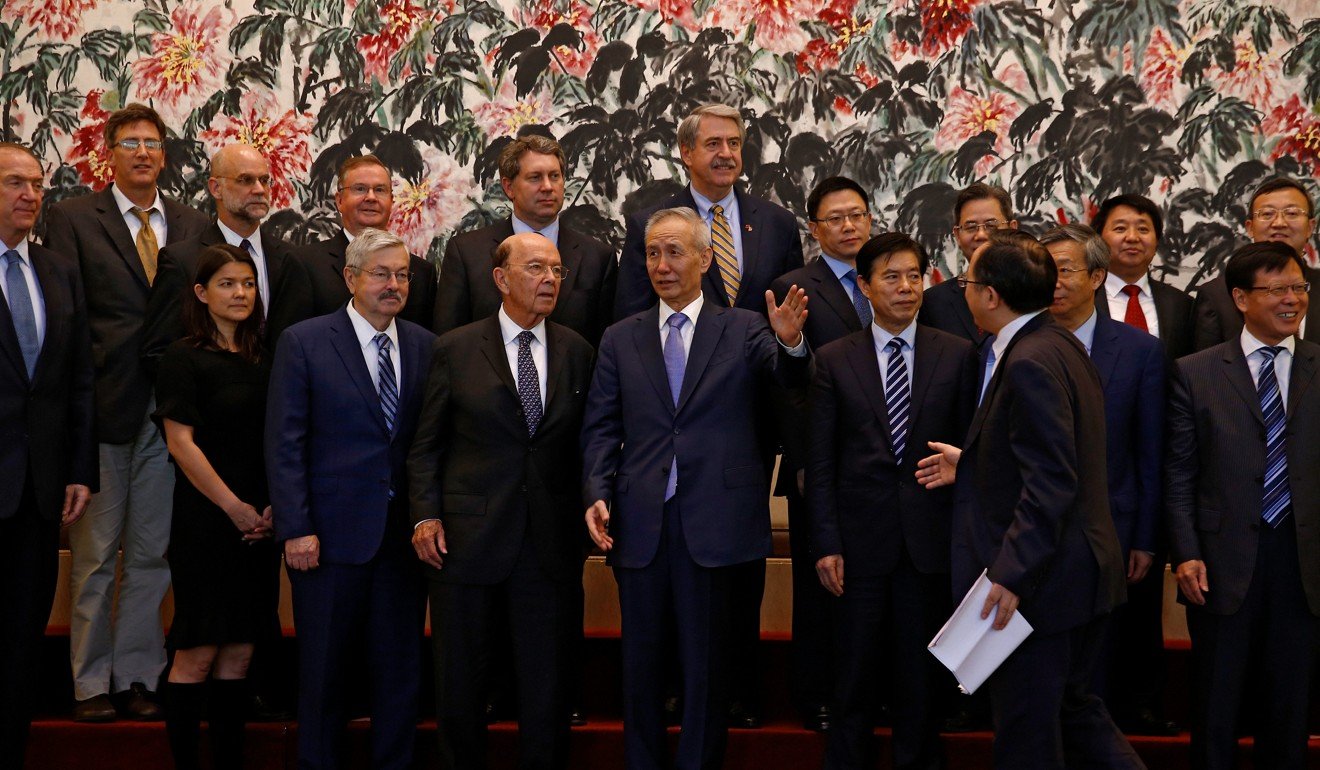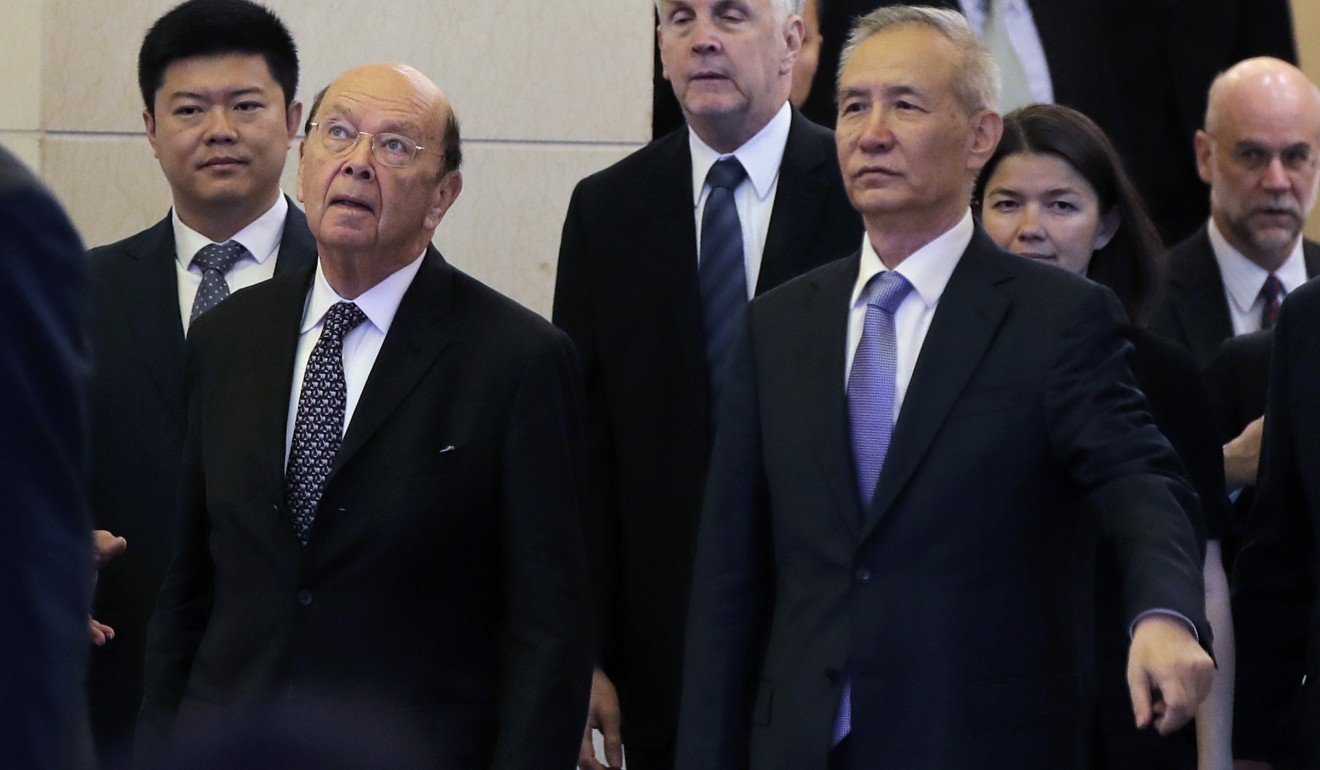
Beijing warns Washington: all trade promises are off if US imposes tariffs
With no specifics given by either side after second round of talks in Chinese capital, analysts say they appear to have ‘ended in another stalemate’
The latest round of back-and-forth trade negotiations between Beijing and Washington ended on Sunday with a warning from Beijing that its trade promises will “not go into effect” if the US puts any sanctions – including additional tariffs – back on the table.
Beijing’s strong statement puts the ball firmly back in the court of US President Donald Trump as to whether Washington should go ahead with tariff plans against Chinese products and risk a full-blown trade war, or if it should take a step back and accept the concessions China has offered.
No specifics were announced by either side after the second round of trade talks in the Chinese capital over the weekend, this time between an American delegation led by US Commerce Secretary Wilbur Ross and a Chinese team headed by Vice-Premier Liu He.
While the Chinese side said talks between Ross and Liu had made “positive and concrete progress” on agreements reached in Washington in areas such as agriculture and energy, it said the details needed “further confirmation”.
“The achievements reached by both China and the US should be based on the premise that the two sides are coming from opposite directions and will not fight a trade war,” state news agency Xinhua said on Sunday.
“If the United States introduces trade sanctions, including levying additional tariffs [on Chinese products], all the economic and trade agreements reached by both sides will not go into effect,” it added.

Washington has yet to release its statement on the talks, although Ross said earlier on Sunday that discussions between the world’s two largest economies had been “friendly and frank”, with the 50-member delegation from the US raising topics including additional Chinese purchases of US exports.
Analysts say the latest trade talks may not have ended conclusively, with the recently threatened tariffs on Chinese technology imports not yet off the table, even if Beijing agreed to make certain concessions.
“It seems like negotiations ended in another stalemate, without either side really conceding anything,” Nick Marro, an analyst with the Economist Intelligence Unit, said. “There’s still a lot of uncertainty. The statement from Xinhua makes it seem, however, that tariffs are still very much on the table.”
It also critically did not mention the “Made in China 2025” innovation strategy – a key part of US complaints about Chinese policies on technology development – indicating a lack of agreement on that initiative, he said.

The White House said last week it would impose punitive tariffs on US$50 billion worth of Chinese imports and the list of targeted products would be published on June 15, including those relating to the Made in China 2025 plan. It also planned to announce investment restrictions and export controls on “industrially significant technology” on June 30.
China may have made concessions – like committing to buy more US goods and even to tackle long-standing complaints such as its alleged theft of US intellectual property – but the end result will be up to Trump, said John Gong, an economics professor at the University of International Business and Economics (UIBE) in Beijing.
“While Liu He has the decision-making authority in the discussions, Ross may not have this type of authority, so he needs to first head back to Washington and report to Trump,” he said. “This is not the conclusion of the talks ... the US$50 billion in threatened tariffs were a bargaining chip in these trade negotiations.”
Earlier trade talks between China and the US in Washington saw Beijing pledging to “significantly increase” its purchases of US agricultural goods, which Trump touted on Twitter as “one of the best things to happen to [US] farmers in many years”.
“I think we have very broad objectives that are across a rebalancing of the trade relationship and the trade deficits,” he said.
Wei Zongyou, who specialises in China-US relations at Fudan University in Shanghai, said China did not want to fight a trade war, but it would not be willing to be the only one making concessions.
“Whether China and the US can come to binding economic and trade agreements depends on the upcoming policy initiatives of the Trump administration,” he said. “If the US insists on levying tariffs on China’s hi-tech products, China will be unlikely to increase imports of US agricultural or energy products, and it could even lead to reprisals from the Chinese side.”
Beijing has also repeatedly said it would further open its domestic market and investment environment and improve intellectual property rights, saying it has long been seeking to make these changes for its own national development, even before it came under pressure from Washington – a claim many observers treat with scepticism.
The trade talks in Beijing also took place after the US levied steel and aluminium tariffs on its own allies Canada, Europe and Mexico, which analysts say reflects the Trump administration’s use of tariffs as bargaining chips in broader trade negotiations.
But even if the latest talks in Beijing help to avert a full-scale trade war, tensions between the world’s two largest economies will be a long-term issue, according to Gong.
“Any silence on trade will not last,” he said. “As we see with the US steel tariffs, including on US allies, it’s just a means to an end, with the final goal being to renegotiate the trade negotiations.”
Ma Xiangjun, an international trade expert at the UIBE, said that while China had consistently made concessions, Trump would be under pressure with the midterm elections looming in November.
“Trump feels he has been taken advantage of in all these trade negotiations, with both China and the US allies,” she said. “But this is a broader issue, as the US position as a great power continues to decline – with China threatening that position. The US is using trade as a strategic means in this broader shift in the global balance of power.”
Additional reporting by Associated Press

